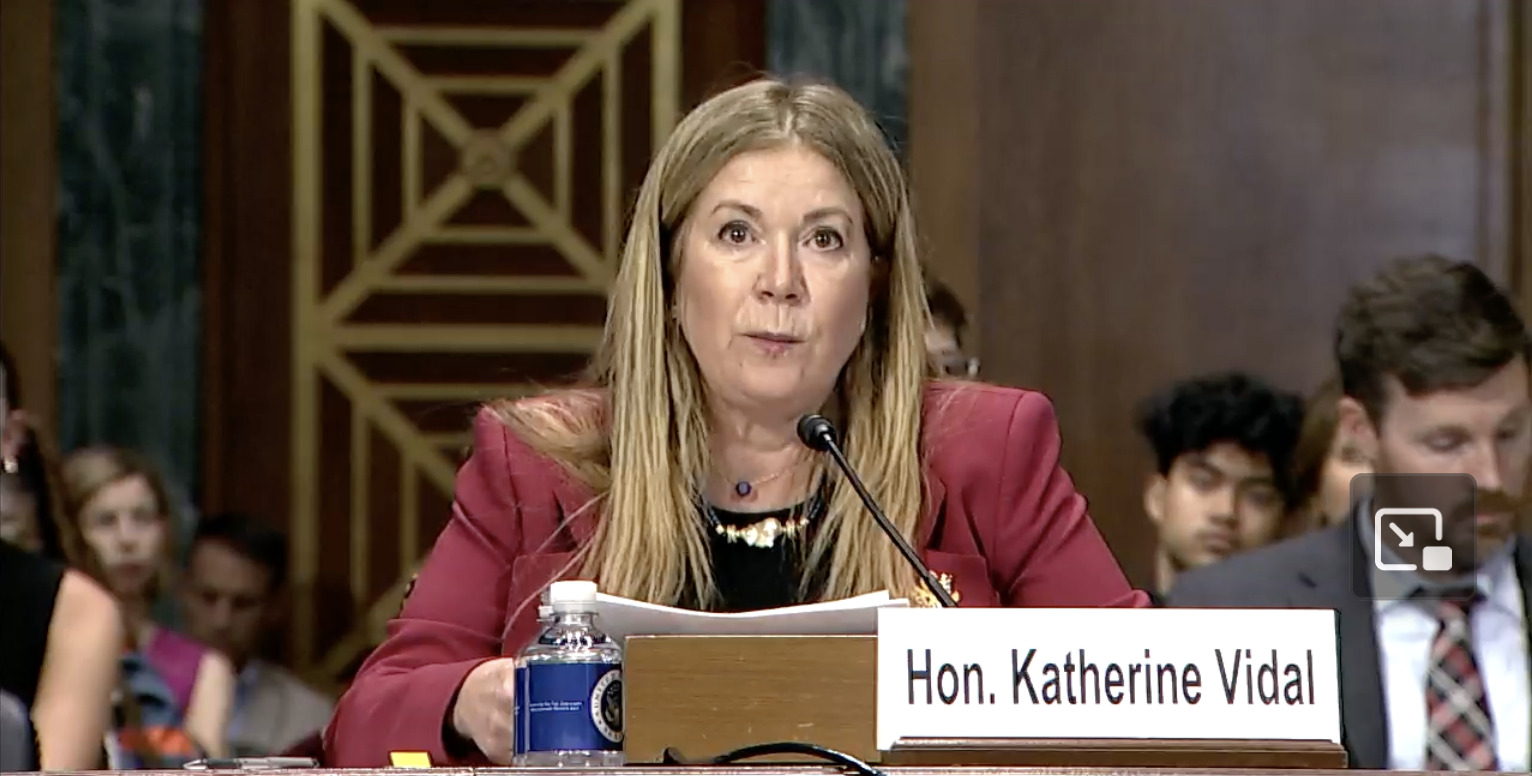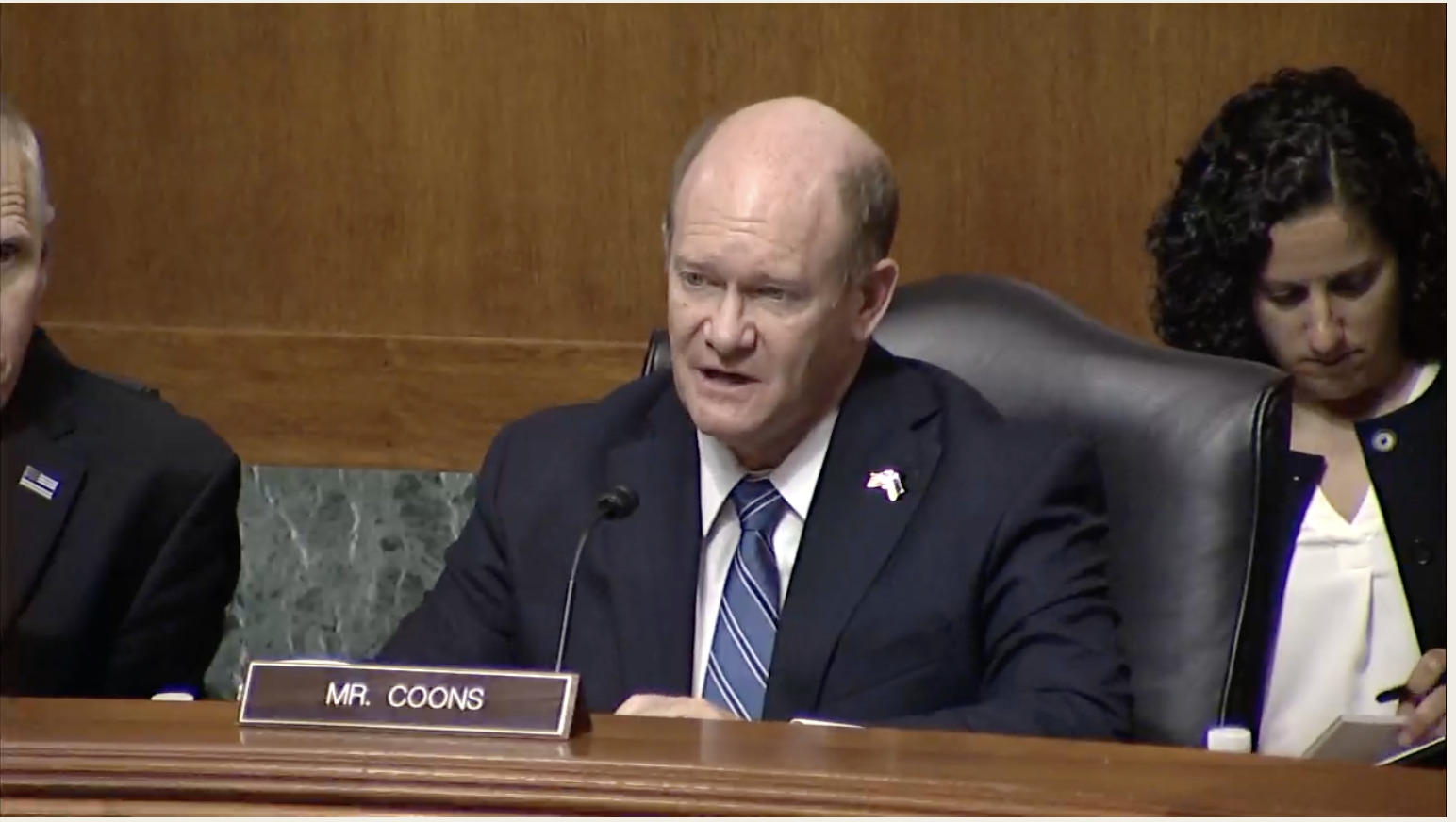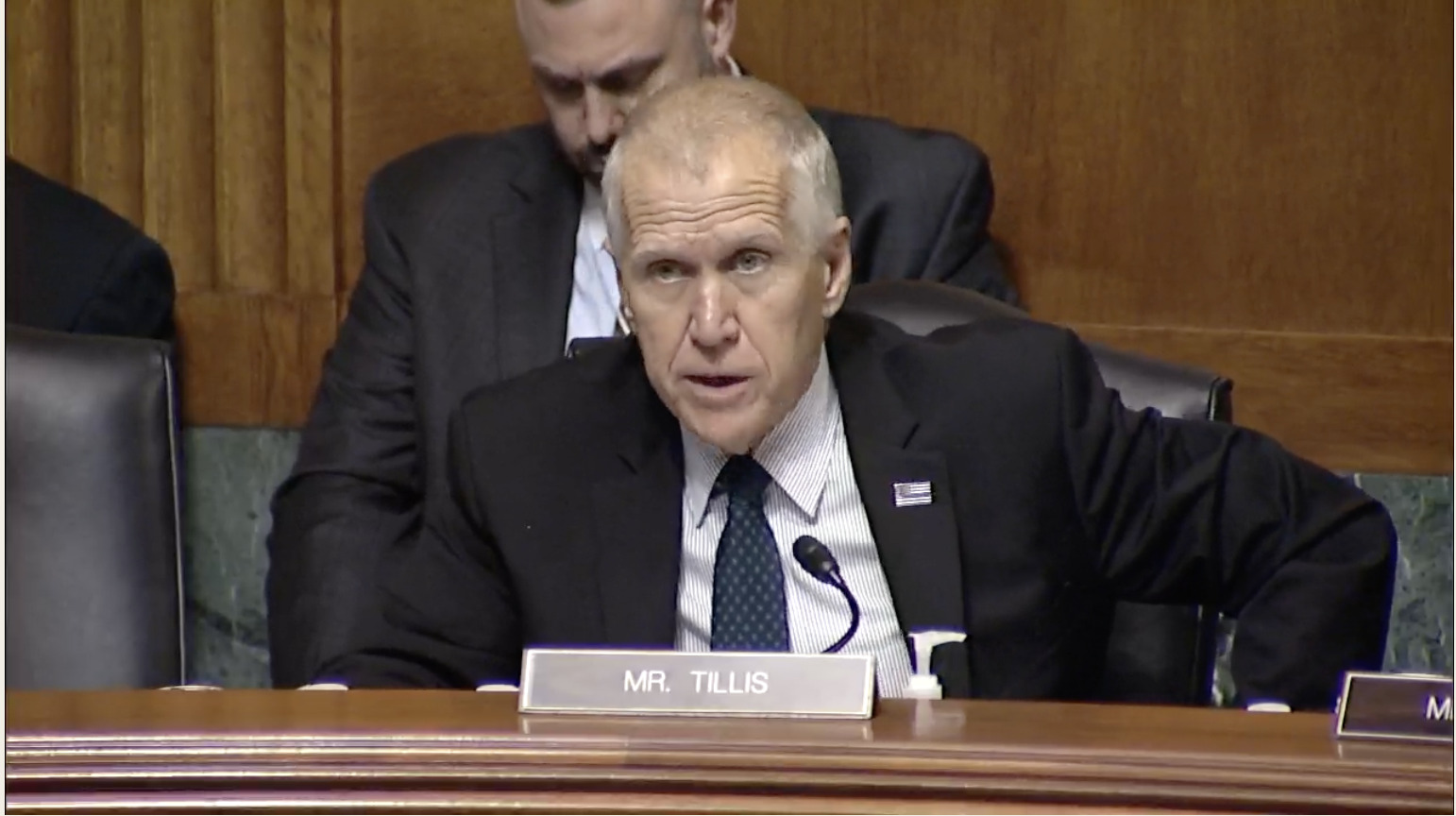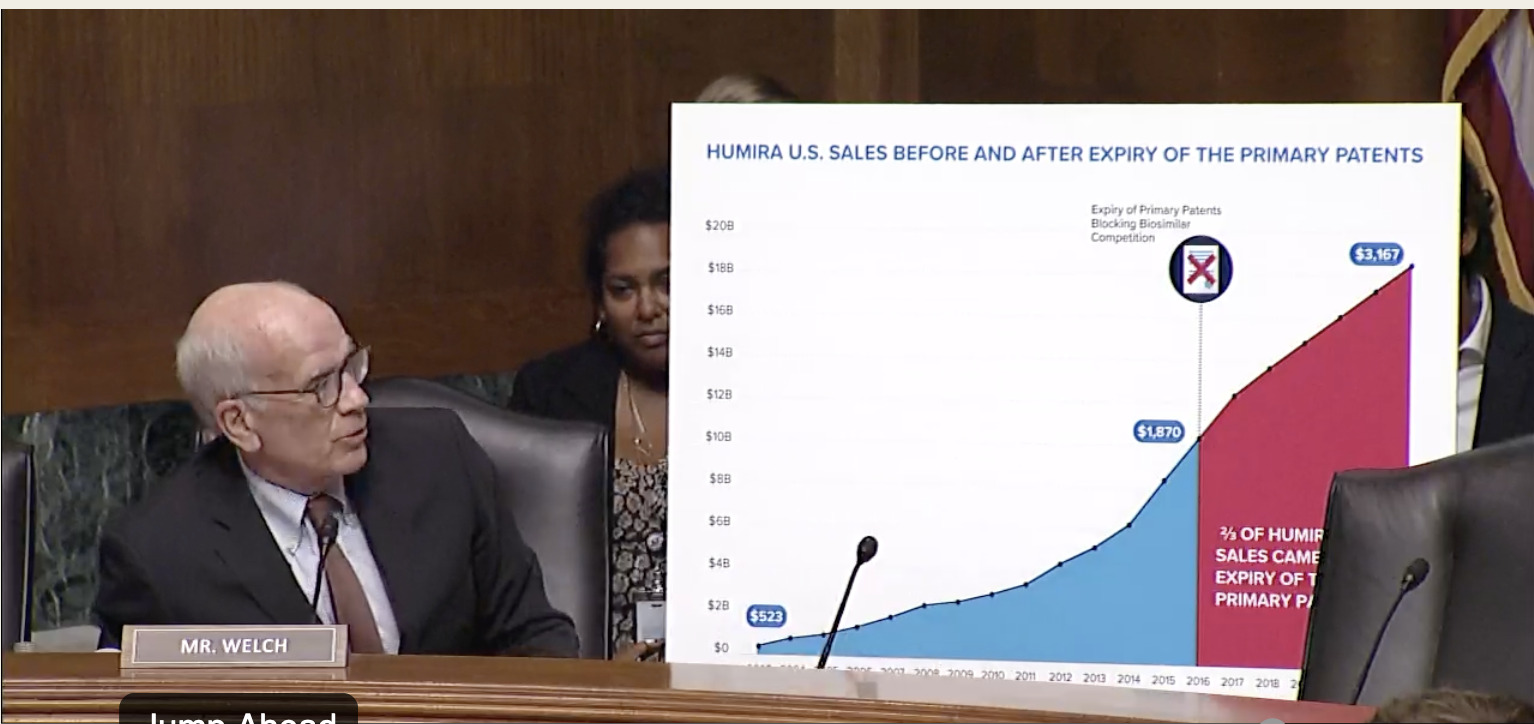“There may be two separate NPRMS—one substantive and one procedural—and Vidal said she plans to announce soon which ANPRM proposals they will NOT be moving forward with.”
 The Senate Subcommittee on Intellectual Property today held a hearing on Oversight of the United States Patent and Trademark Office (USPTO), with USPTO Director Kathi Vidal as the sole witness. Only a handful of senators questioned Vidal, and only one significantly challenged her in questioning.
The Senate Subcommittee on Intellectual Property today held a hearing on Oversight of the United States Patent and Trademark Office (USPTO), with USPTO Director Kathi Vidal as the sole witness. Only a handful of senators questioned Vidal, and only one significantly challenged her in questioning.
The hearing differed considerably from the House IP Subcommittee’s Oversight Hearing in April, where Vidal was repeatedly taken to task on the Office’s then-recently issued Advance Notice of Proposed Rulemaking (ANPRM). In today’s hearing, Vidal told Subcommittee Chair Chris Coons (D-DE) the Office is working on putting the Notice of Proposed Rulemaking (NPRM) together now; that there may be two separate NPRMS—one substantive and one procedural; and that she plans to announce soon which ANPRM proposals they will NOT be moving forward with.
As with the House hearing, Vidal explained more than once that the ANPRM proposals are not official proposed rules and that they are a combination of Office-driven proposals based on what has been proven to be working and stakeholder proposals that may or not make it to the next stage.
Senator Alejandro Padilla (D-CA) asked Vidal to respond to two op-eds published recently by former Senator Patrick Leahy (D-VT) asserting that the ANPRM conflicts with the America Invents Act (AIA) and exceeds the USPTO’s statutory authority. Vidal replied confidently that everything in the ANPRM is within the Office’s authority, though they will not be moving forward with everything.
 While Vidal acknowledged in response to a question from Coons about parallel proceedings in district court and the PTAB that many stakeholders have concerns about such practices, she stopped short of agreeing with Coons that they are counter to congressional intent. “My views are going to be informed by responses to the ANPRM,” Vidal said. “I do think there are concerns with overlapping proceedings. In terms of where the USPTO draws the line…my views on that will be informed by the responses to the ANPRM.”
While Vidal acknowledged in response to a question from Coons about parallel proceedings in district court and the PTAB that many stakeholders have concerns about such practices, she stopped short of agreeing with Coons that they are counter to congressional intent. “My views are going to be informed by responses to the ANPRM,” Vidal said. “I do think there are concerns with overlapping proceedings. In terms of where the USPTO draws the line…my views on that will be informed by the responses to the ANPRM.”
Coons also expressed his concerns to Vidal about China’s overtaking of the United States in key areas of innovation, as well as the threat of counterfeits and other abuses of the system. Addressing what the USPTO is doing about these issues, Vidal said she is actively engaged with other government departments on the China threat and that she has made counterfeiting one of her primary goals while in office.
Coons, along with Subcommittee Ranking Member Thom Tillis (R-NC) have in recent months introduced the Patent Eligibility Restoration Act of 2023 and the Promoting and Respecting Economically Vital American Innovation Leadership (PREVAIL) Act, and plan to soon reintroduce the online counterfeits-focused Stopping Harmful Offers on Platforms by Screening Against Fakes in E-Commerce (SHOP SAFE) Act.
With respect to the ANPRM’s proposal of a standing requirement for inter partes review (IPR), which overlaps with a provision in the PREVAIL Act, Vidal’s response suggested it would make it to the NPRM. She commented:
“What we’re seeing at the PTAB is when the parties do have what might qualify as a standing requirement, their activities tend to align with their business purposes. When parties don’t have what would qualify as a standing requirement, we’ve seen parties take advantage of the system. There have been recent instances of that where the parties are trying to monetize and otherwise use the PTAB for personal gain as opposed to its original intent.”
USPTO Priorities
Vidal in her opening statement outlined several areas the USPTO is focused on. They include: 1) artificial intelligence (AI); 2) working toward robust, reliable and transparent IP rights; 3) the intersection of IP and competition policy; 4) an “all-of-government approach” to leveraging IP rights; and 5) reshaping the USPTO as “a workplace centered around the values of purpose, opportunity, equity, inclusion and wellness, to better serve the American public and stakeholder community.”
 These goals are “in addition to the transparent, data-driven and surgical changes we have made and intend to make this administration to better support our stakeholders and the issues they face,” Vidal said.
These goals are “in addition to the transparent, data-driven and surgical changes we have made and intend to make this administration to better support our stakeholders and the issues they face,” Vidal said.
Tillis questioned Vidal on patent eligibility and she confirmed her previous public statements that a fix is needed. She pointed to the USPTO/ DOJ brief in the Tropp case as well as the Office’s 2022 Report to Congress, where the Office’s position on current eligibility is outlined. She also noted that the Office is still considering whether to update or modify the Patent Eligibility Guidance issued by her predecessor, Andrei Iancu, but said “within our purview there’s only so much we can do.”
Diversity Efforts and Patent Thickets
Senator Mazie Hirono (D-HI) questioned Vidal about her diversity efforts and specifically efforts to engage more women inventors. She noted that a recent report by the National Bureau of Economic research and Citigroup estimated that closing racial and gender patent gaps would add $1 trillion to the nation’s GDP. Vidal responded by listing her numerous efforts on this front, including her work on the Council for Inclusive Innovation and the Women’s Entrepreneurship Initiative. She said she is also working to find ways to both satisfy the Paperwork Reduction Act requirements and still collect demographics data that would help to quantify the racial and gender gaps. Finally, she pointed to her work on broadening the patent bar, including the new design patent bar proposal and considerations underway for broadening the PTAB bar.
 The only senator to challenge Vidal in any real way was Senator Peter Welch (D-VT). Welch’s concern was the pharmaceutical industry’s purported practice of creating patent thickets to extend the life of patents, which Welch cited as the reason for higher drug prices here than in other countries. He presented a chart showing that the price of AbbVie’s Humira is now more than $3,000 in the United States while it’s $225 in Sweden and $10 in Germany. When he asked Vidal what the USPTO’s role is in stopping pharmaceutical companies from extending their patents, he cut her off when she began to talk about drug pricing, redirecting her to the question of what the USPTO’s role is in stopping such patent extensions. Vidal attempted to explain that it’s not possible to extend a patent, but that she is looking into issues surrounding Patent Term Adjustment (PTA) and obviousness-type double patenting for pharmaceutical patents.
The only senator to challenge Vidal in any real way was Senator Peter Welch (D-VT). Welch’s concern was the pharmaceutical industry’s purported practice of creating patent thickets to extend the life of patents, which Welch cited as the reason for higher drug prices here than in other countries. He presented a chart showing that the price of AbbVie’s Humira is now more than $3,000 in the United States while it’s $225 in Sweden and $10 in Germany. When he asked Vidal what the USPTO’s role is in stopping pharmaceutical companies from extending their patents, he cut her off when she began to talk about drug pricing, redirecting her to the question of what the USPTO’s role is in stopping such patent extensions. Vidal attempted to explain that it’s not possible to extend a patent, but that she is looking into issues surrounding Patent Term Adjustment (PTA) and obviousness-type double patenting for pharmaceutical patents.
Following the exchange, Tillis asked Vidal about his letters asking the USPTO to look into data published by the Initiative for Medicines, Access & Knowledge (I-MAK), which has been accused of providing inaccurate figures on patent exclusivity. “We need to make sure we’re all talking from the same facts.,” Tillis said. “I want a good, independent assessment of data.” Vidal said she is working on it with the Food & Drug Administration.
Other initiatives Vidal mentioned during the hearing included a recent Federal Register Notice on strategies for anticounterfeiting and antipiracy and working with the European Union Intellectual Property Office in Geneva on ways to address Standard Essential Patent problems. Vidal said there will be an FRN on that soon as well to seek feedback. “When we withdrew the 2019 Policy Statement it was because we see standards as an international issue,” she said.
When asked by Tillis what more Congress could do to help the USPTO, Vidal also noted that the Office currently has “$1.3 billion locked up that we have not been able to get access to.”

![[IPWatchdog Logo]](https://ipwatchdog.com/wp-content/themes/IPWatchdog%20-%202023/assets/images/temp/logo-small@2x.png)

![[Advertisement]](https://ipwatchdog.com/wp-content/uploads/2024/04/UnitedLex-May-2-2024-sidebar-700x500-1.jpg)
![[Advertisement]](https://ipwatchdog.com/wp-content/uploads/2024/04/Artificial-Intelligence-2024-REPLAY-sidebar-700x500-corrected.jpg)
![[Advertisement]](https://ipwatchdog.com/wp-content/uploads/2024/04/Patent-Litigation-Masters-2024-sidebar-700x500-1.jpg)

![[Advertisement]](https://ipwatchdog.com/wp-content/uploads/2021/12/WEBINAR-336-x-280-px.png)
![[Advertisement]](https://ipwatchdog.com/wp-content/uploads/2021/12/2021-Patent-Practice-on-Demand-recorded-Feb-2021-336-x-280.jpg)
![[Advertisement]](https://ipwatchdog.com/wp-content/uploads/2021/12/Ad-4-The-Invent-Patent-System™.png)






Join the Discussion
5 comments so far.
PTO Indentured
July 27, 2023 11:59 amYou mean “engage more women” of innovation like a Molly Metz so that the PTAB can be clearly shown to be an equal opportunity crusher of US inventors and their livelihoods regardless of gender — and a distinct inventive improvement made to a device? Thanks to AIA: PTAB merely needs its oxymoronic ‘broadest reasonable’ interpretation and literally ‘anything goes’.
It is worth (and just) noting too: that worldwide not a single country has parity in the rights accorded to both men and women — as can be seen in practice. For those truly considering the value of the contributions of innovation, how fitting is it to have half the population — and braintrust — of the world knowingly kept in such a compromised state?
The above conditions are based on biases and prejudices (such as Fairy Tales) — taught, paid-for (lavishly), learned, accepted and imitated — which once-entrenched are not self-correcting, nor addressed by a glib sound bite. Make light of it if you will, but such conditions surely are not helping US innovation and inventions.
Pro Say
July 27, 2023 11:56 amSo every once in awhile this washed up, over-the-hill Leahy fellow feels the need to raise his head up from his retirement pasture to spew more of his discredited IP baloney.
His America Invalidates Act is one the biggest reasons China continues to rise while American innovation is on the ropes.
Do America a favor and get yerself back to chewing your cud, Leahy.
Anon
July 27, 2023 11:03 amThis doesn’t even mention—though the hearing did— that there were 14,500+ comments, almost entirely negative, and the ANPRM is widely unpopular
Model 101
July 27, 2023 09:55 amMost patents are not eligible under 101.
Would be women inventors- beware!
Invention in America is crooked.
Don’t waste your time and money.
B
July 26, 2023 07:00 pm“Senator Mazie Hirono (D-HI) questioned Vidal about her diversity efforts and specifically efforts to engage more women inventors.”
Just totally stupid – but consistent with Hirono.
Want more women inventors? Get more women into STEM.